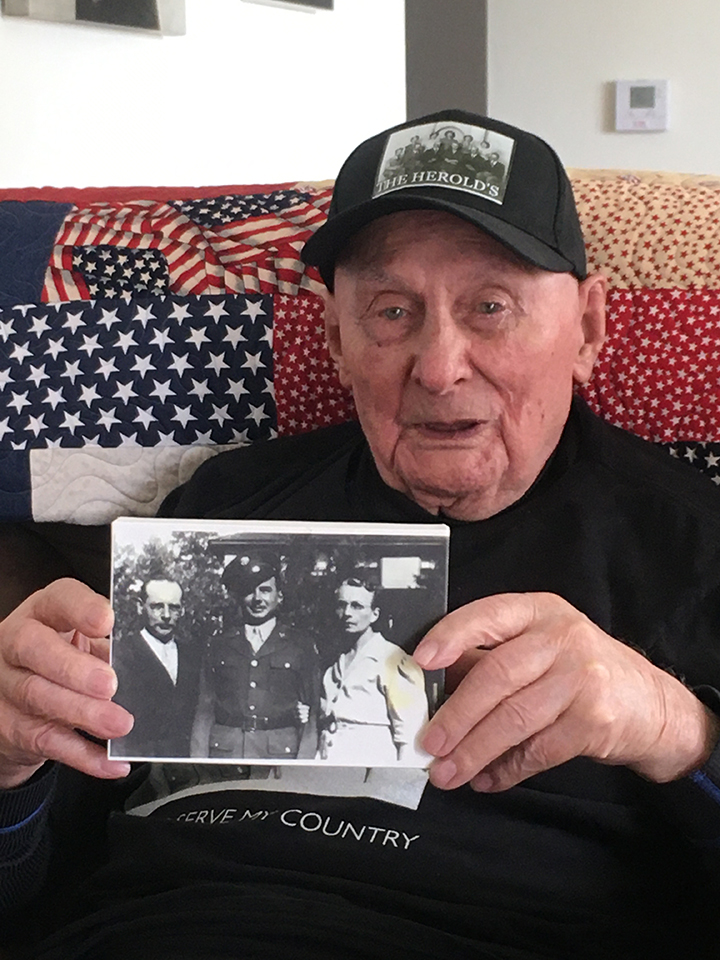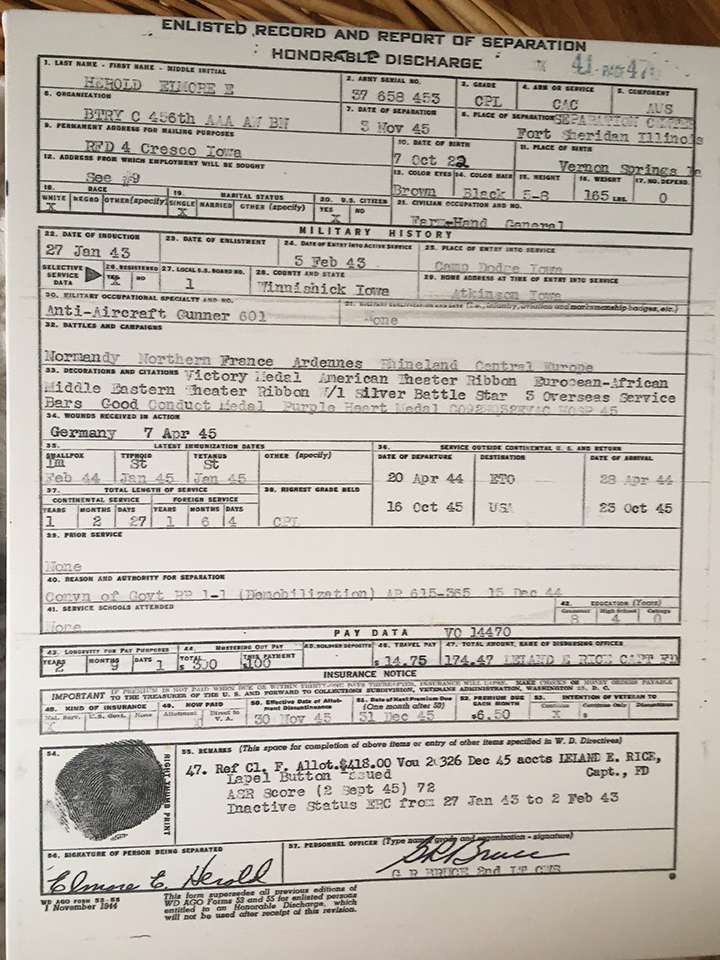Waterloo vet, dad kept their promise during WWII
Posted
by Pat Kinney
on Wednesday, September 7, 2022
Elmore Herold had a "close shave" in World War II. His father Carl didn't shave at all - not until his boy got home.
Telling the story still made Elmore's eyes well up with tears, three quarters of a century later.
"He told me, 'I'm not gonna shave until you get back.' " Elmore said.
He returned from the war to see his father with a full beard.
"He didn't shave. He kept his word and I kept mine. I got home safely."
Herold almost didn't - and he has a Purple Heart for combat wounds to show for it. But it was quite a homecoming.
"I'm very proud of him," he said of his father, voice quivering slightly.
Herold retold the story in a Voices of Iowa oral history interview with the Grout Museum District, one month before his 100th birthday Oct. 7, 2022.

Elmore Herold of Waterloo holds a photo of himself and his parents, taken the day before he left for service in World War II.

Elmore Herold's military discharge record.
Getting home was far from a sure thing. Many others Herold served with, he said, "didn't have that privilege."
Herold was a native of Cresco who worked for The Rath Packing Co. in Waterloo after the war. He served on a mobile anti-aircraft gun crew in the 546th Anti-Aircraft Artillery Battalion of Gen. George S. Patton Jr.'s U.S. Third Army. He served in campaigns in Normandy, Northern France the Ardennes Forest and the Rhineland.
"We had some very good leaders," Herold said, including Patton, who believed in taking the fight to the enemy - and not the other way around.
Herold was wounded and spent six months in an Army hospital, returning to his unit before war's end, in time for Patton's forces to liberate the Nazi concentration camp at Buchenwald.
"It wasn't anything that I like to speak about," he said. "Corpses piled high on top of each other, naked bodies." Official records said prisoners there were worked, starved and tortured to death. At one time the camp had 80,000 people; 200 people a day were dying there at the time Herold and his comrades liberated the camp.
For a time after recuperating from his wounds, Herold also served as an armed escort for Red Cross nurses to various aid stations wherever they were needed.
After the war, Herold worked more than 40 years at The Rath Packing Co., surviving a serious accident there when he was severely burned when a pipe burst containing slaughterhouse byproducts; he was burned trying to save a co-worker who later perished. He worked another 24 years for the St. Vincent de Paul Society in Waterloo in a number of capacities, ranging from working in the warehouse, to meals delivery, to participating in the annual Christmas relief for needy families. An avid fisherman, he also worked many years as a fishing guide in Wisconsin, having once landed an 88 pound sturgeon.
He and his wife Lucille, whom he cared for for many years while she was in declining health, were married 70 years and had three children, including two sons who served in Vietnam. Lucille passed away in 2016.
In 2017, he received the Waterloo Exchange Club's Book of Golden Deeds award, which cited his lifetime of service, dating back to his time in the Army.
"There were a lot of young guys my age. We were very well trained for what we had to do. I was lucky I got home safely."
The Grout Museum District and the Sullivan Brothers Iowa Veterans Museum invites all military veterans of all eras and branches of service to tell their stories for posterity in video recorded oral history interviews for our archives and exhibits. They receive a complimentary DVD of the inteview. More information may be obtained by contacting Bob Neymeyer or Pat Kinney at the Grout at (319) 234-6357, Bob.Neymeyer@gmdistrict.org or Pat.Kinney@gmdistrict.org. Information about the Voices of Iowa project also can be found here.